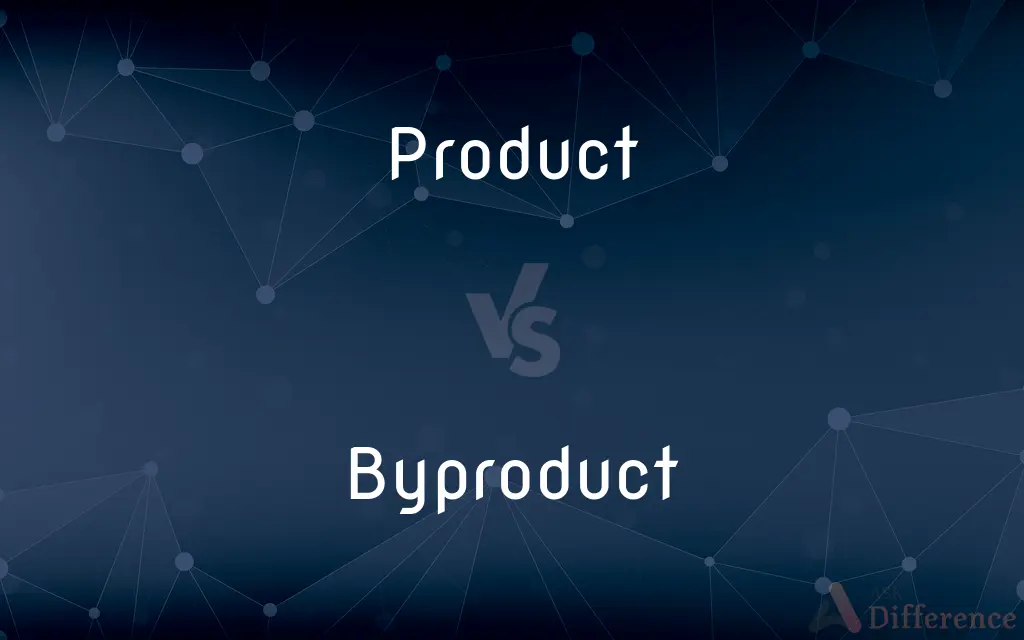Product vs. Byproduct — What's the Difference?
By Tayyaba Rehman & Urooj Arif — Updated on April 3, 2024
A product is the primary outcome intended from a process, while a byproduct is a secondary result, not the main objective. Products are central to production goals; byproducts are incidental.

Difference Between Product and Byproduct
Table of Contents
ADVERTISEMENT
Key Differences
A product is the main result of a manufacturing or natural process, created intentionally to meet specific consumer or industry needs. For example, in a dairy, the primary product is milk. Byproducts, on the other hand, are the unintended outcomes that occur alongside the production of the main product, such as whey from cheese making. These byproducts can sometimes be unused, recycled, or developed into new products.
While products often drive business models and market strategies, byproducts may not initially have a clear market value. However, innovative companies have found ways to monetize byproducts, turning what might be waste into profit. For instance, sawdust, a byproduct of lumber processing, is used in making particleboard.
The production focus and resource allocation primarily revolve around the product. In contrast, byproducts are typically considered after the main production process is established. This perspective can influence how a company organizes its operations and prioritizes its research and development efforts.
Regulatory and environmental considerations also differentiate products from byproducts. Products must meet specific standards and regulations before they can be sold, whereas byproducts might be subject to different, often less stringent, regulatory frameworks, depending on their use or disposal.
Marketing and consumer perception play a significant role in distinguishing products from byproducts. While products are usually marketed based on their features, benefits, and brand identity, byproducts might be marketed more on the basis of sustainability or as an economical alternative, if they are marketed at all.
ADVERTISEMENT
Comparison Chart
Definition
The primary outcome of a process, intentionally produced.
A secondary result of a process, not intentionally produced.
Purpose
To meet specific consumer or industry needs.
Often incidental, not originally intended for use or sale.
Market Value
Central to business models, with clear market value.
May not have clear market value initially; can vary widely.
Regulatory Focus
Subject to specific standards and regulations for sale.
Subject to different or less stringent regulations.
Consumer Perception
Marketed based on features, benefits, and brand.
Often marketed as sustainable or economical, if at all.
Compare with Definitions
Product
They are created to fulfill a specific demand.
Eco-friendly products are becoming more popular.
Byproduct
Their production is usually unintentional.
Heat is a byproduct of many industrial processes.
Product
A product is an item produced for sale or use.
Smartphones are the main product of many tech companies.
Byproduct
It may have less economic value than the main product.
Sawdust is often considered a byproduct of woodworking.
Product
A product undergoes a development process before it reaches the market.
The new car model was the product of years of research and design.
Byproduct
A byproduct is a secondary result of a production process.
Molasses is a byproduct of sugar refining.
Product
It's a result of labor or manufacturing process.
The bakery's product line includes bread and pastries.
Byproduct
Byproducts sometimes pose environmental disposal challenges.
The disposal of chemical byproducts is heavily regulated.
Product
Products can be tangible or intangible.
Software as a product has transformed the tech industry.
Byproduct
Byproducts can be repurposed into new products.
Biofuel is a byproduct of the brewing industry.
Product
An item that is made or refined and marketed
Farm products.
Soaps, detergents, and similar products.
Travel products such as vacation trips.
Byproduct
Something produced in the making of something else.
Product
Such items considered as a group
Sold a lot of product in May.
Byproduct
A secondary result; a side effect.
Product
A preparation, such as a gel, used for styling hair
Began to use product soon after he became famous.
Byproduct
Alternative form of by-product
Product
A substance resulting from a chemical or nuclear reaction.
Byproduct
A secondary and sometimes unexpected consequence
Product
A direct result; a consequence
"Is history the product of impersonal social and economic forces?" (Anthony Lewis).
Byproduct
A product made during the manufacture of something else
Product
A person whose characteristics or abilities are the result of certain influences or kinds of experience
"She is the product of an America in which explicit displays of pride in intellect are considered unseemly" (Yuval Levin).
Product
The number or quantity obtained by multiplying two or more numbers together.
Product
A scalar product.
Product
A vector product.
Product
Anything that is produced; a result.
The product of last month's quality standards committee is quite good, even though the process was flawed.
Product
The amount of an artifact that has been created by someone or some process.
They improve their product every year; they export most of their agricultural production.
Product
A consequence of someone's efforts or of a particular set of circumstances.
Skill is the product of hours of practice.
His reaction was the product of hunger and fatigue.
Product
(chemistry) A chemical substance formed as a result of a chemical reaction.
This is a product of lime and nitric acid.
Product
(arithmetic) A quantity obtained by multiplication of two or more numbers.
The product of 2 and 3 is 6.
The product of 2, 3, and 4 is 24.
Product
(mathematics) Any operation or a result thereof which generalises multiplication of numbers, like the multiplicative operation in a ring, product of types or a categorical product.
Product
Any tangible or intangible good or service that is a result of a process and that is intended for delivery to a customer or end user.
Product
A commodity offered for sale.
That store offers a variety of products.
We've got to sell a lot of product by the end of the month.
Product
Any preparation to be applied to the hair, skin, nails, etc.
Wash excess product out of your hair.
Product
Illegal drugs, especially cocaine, when viewed as a commodity.
I got some product here – you buying?
Product
To produce.
Product
Anything that is produced, whether as the result of generation, growth, labor, or thought, or by the operation of involuntary causes; as, the products of the season, or of the farm; the products of manufactures; the products of the brain.
There are the productOf those ill-mated marriages.
These institutions are the products of enthusiasm.
Product
The number or sum obtained by adding one number or quantity to itself as many times as there are units in another number; the number resulting from the multiplication of two or more numbers; as, the product of the multiplication of 7 by 5 is 35. In general, the result of any kind of multiplication. See the Note under Multiplication.
Product
To produce; to bring forward.
Product
To lengthen out; to extend.
He that doth much . . . products his mortality.
Product
To produce; to make.
Product
Commodities offered for sale;
Good business depends on having good merchandise
That store offers a variety of products
Product
An artifact that has been created by someone or some process;
They improve their product every year
They export most of their agricultural production
Product
A consequence of someone's efforts or of a particular set of circumstances;
Skill is the product of hours of practice
His reaction was the product of hunger and fatigue
Product
A chemical substance formed as a result of a chemical reaction;
A product of lime and nitric acid
Product
A quantity obtained by multiplication;
The product of 2 and 3 is 6
Product
The set of elements common to two or more sets;
The set of red hats is the intersection of the set of hats and the set of red things
Common Curiosities
What is a product?
A product is the main outcome intended for use or sale, produced through a manufacturing or natural process.
What is a byproduct?
A byproduct is a secondary outcome that occurs alongside the main production process, often unintentionally.
How do products differ from byproducts in terms of market value?
Products have a clear market value and drive business models, whereas byproducts may not have an initial market value and can vary widely in their economic importance.
Can byproducts become products?
Yes, byproducts can be developed into new products, especially when they are found to have beneficial uses or market demand.
How do companies benefit from byproducts?
Companies can benefit from byproducts by finding innovative ways to utilize them, thus reducing waste and generating additional revenue.
What is an example of a product?
An example of a product is a smartphone, which is designed, manufactured, and sold to meet consumers' communication needs.
What role does consumer perception play in the marketing of products vs. byproducts?
Products are marketed based on their features, benefits, and brand identity, while byproducts might be marketed as sustainable or economical alternatives, if marketed at all.
What is an example of a byproduct?
An example of a byproduct is sawdust, which is produced unintentionally during the process of cutting lumber.
Why are products subject to stricter regulations than byproducts?
Products must meet specific standards and regulations to ensure safety and quality for consumers, whereas byproducts, depending on their use or disposal, might be subject to different or less stringent regulations.
What makes a byproduct valuable?
A byproduct becomes valuable when it can be used in other processes or sold, particularly if it contributes to sustainability or meets a specific market demand.
Are all byproducts waste?
Not all byproducts are waste; many can be repurposed or used in other productive ways, reducing overall waste.
How do environmental concerns influence the handling of byproducts?
Environmental concerns necessitate careful handling, recycling, or disposal of byproducts to minimize their ecological impact.
What impact do byproducts have on production costs?
Byproducts can impact production costs by providing additional revenue streams or requiring disposal, which can either offset or increase overall costs.
How do regulatory considerations affect products and byproducts?
Regulatory considerations ensure that products meet safety and quality standards, while byproducts may be governed by regulations focusing on environmental impact and disposal.
Can the classification of a substance as a product or byproduct change over time?
Yes, as market demands and technological advancements occur, what is considered a byproduct can become a valuable product.
Share Your Discovery

Previous Comparison
Physiology vs. Psychology
Next Comparison
Equipment vs. MachineryAuthor Spotlight
Written by
Tayyaba RehmanTayyaba Rehman is a distinguished writer, currently serving as a primary contributor to askdifference.com. As a researcher in semantics and etymology, Tayyaba's passion for the complexity of languages and their distinctions has found a perfect home on the platform. Tayyaba delves into the intricacies of language, distinguishing between commonly confused words and phrases, thereby providing clarity for readers worldwide.
Co-written by
Urooj ArifUrooj is a skilled content writer at Ask Difference, known for her exceptional ability to simplify complex topics into engaging and informative content. With a passion for research and a flair for clear, concise writing, she consistently delivers articles that resonate with our diverse audience.
















































